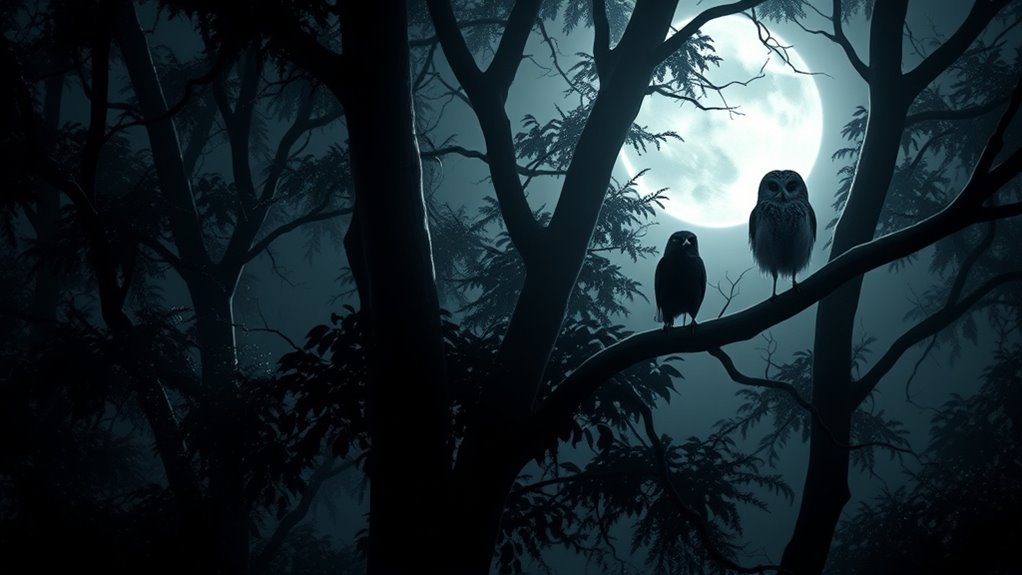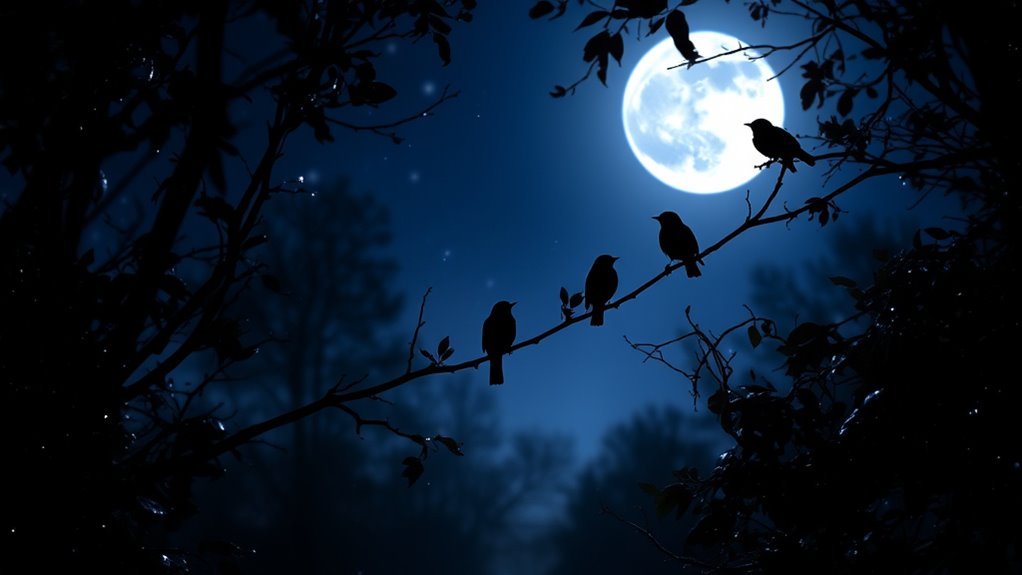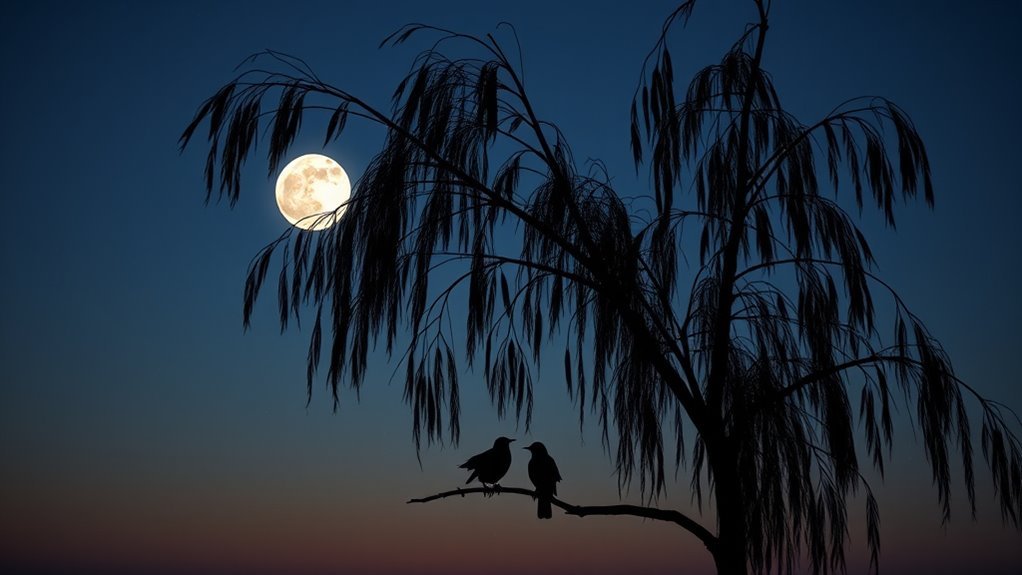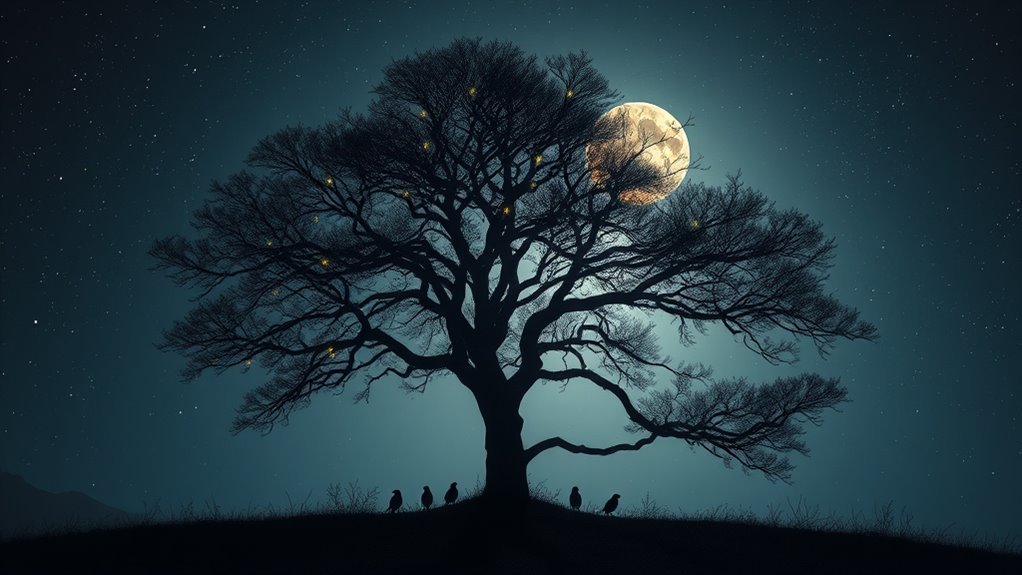Why Do Birds Chirp at Night? Spiritual Interpretations Unveiled
Some birds sing at night, which is unusual since night is typically quiet. This behavior often relates to claiming territory and attracting mates. It shows how instinct interacts with the environment. Many cultures view these nighttime songs as messages from the spirit world. As you learn about this phenomenon, you may discover interesting folklore and spiritual meanings associated with it.
Key Takeaways
- Nocturnal birds chirp to mark territory and attract mates, with spiritual interpretations linking these sounds to communication from ancestors or nature.
- Indigenous cultures often view nighttime bird songs as spiritual messages, embodying connections to the environment and the divine.
- Night songs are incorporated into ceremonies, signifying guidance and reflections on life's transitions and relationships with nature.
- In rural folklore, nighttime bird calls are seen as omens or signs, fostering community ties and shared cultural narratives.
- Understanding the spiritual dimensions of nocturnal birdsong deepens appreciation for their role in both natural and cultural landscapes.
Understanding Nocturnal Bird Behaviors

Nocturnal birds can be surprising to see and hear at night. Some species have adjusted to living and hunting in low light. These birds have strong senses that help them find food and avoid danger when it's dark.
Their calls are important. They mark their territory and attract mates, especially when there are fewer threats from predators and other birds. Observing these behaviors shows us how night and day creatures share the same environment.
Learning about nocturnal birds deepens our understanding of nature and its many adaptations. This knowledge enhances our appreciation for the diversity of life around us.
Common Species That Chirp at Night
Many birds chirp at night and create a unique soundscape. Common nightingales sing beautiful songs, especially during breeding season, to attract mates.
Eastern Screech Owls adapt to urban sounds and call out in a distinctive manner. Nocturnal mockingbirds mimic other birds' songs, adding variety to nighttime sounds.
Common Nighthawks produce raspy calls for communication from hidden spots.
Learning about these birds helps you connect with nature and appreciate the diverse ecosystem around you, even at night.
The Science Behind Nighttime Chirping

Birds don't only chirp during the day; some also vocalize at night. Nighttime chirping serves important purposes. For example, the common nightingale sings to mark its territory or attract mates. With fewer birds active, their calls stand out more.
Nighttime sounds can also change due to predators and surroundings, as birds adapt their calls to stay hidden. The pitch and frequency of these calls can travel long distances through cooler air, increasing their survival chances.
This behavior shows how birds adjust to their environment. Recognizing these patterns helps us appreciate bird life and the role of nighttime communication.
How Moonlight Influences Bird Activity
Moonlight significantly affects bird behavior and activity at night.
It improves visibility, allowing birds to find their way and explore their surroundings more easily. With more light, birds tend to be more active, foraging, socializing, and singing. Research shows that specific bird species are more lively during bright phases of the moon, connecting light intensity to their activity levels.
Moonlight also offers a sense of safety from predators, making it easier for birds to interact and vocalize with each other.
Recognizing how moonlight impacts bird behavior can deepen our understanding of their nighttime life and routines.
The Role of Mating Calls After Dark

Birds use the darkness to make mating calls, which help them attract partners. These calls play a key role in their mating rituals. At dusk, male birds call out to show their presence and health, while females listen to choose the best mates. This highlights the role of sound in bird communication, especially when it's hard to see.
Nighttime creates a quieter space, allowing their calls to be heard more clearly. By calling out at night, birds strengthen their social connections and improve their chances of reproducing.
This shows how the environment affects mating strategies in bird species.
Cultural Perspectives on Nighttime Birdsong
Nighttime birdsong varies across cultures and holds different meanings. Many Indigenous communities see nocturnal bird sounds as spiritual messages. They often incorporate these sounds into ceremonies and storytelling traditions.
In other cultures, nighttime songs symbolize a connection to nature and encourage reflection. Rural folklore sometimes links these songs to ancestral guidance, strengthening community ties.
In urban areas, people might overlook these sounds, but city dwellers can still appreciate them and incorporate them into their lives. Recognizing the cultural significance of nighttime birdsong helps us understand its role in our shared human experience.
This awareness fosters a sense of belonging and connection to nature, enriching our lives as we listen to the world around us.
Spiritual Symbolism of Nocturnal Chirping
Nocturnal birdsong holds significant spiritual meanings in many cultures. These nighttime melodies provide insight and guidance during dark times.
Night birds symbolize the search for truth and self-awareness. Their calls encourage reflection on your spiritual path.
These sounds remind you to listen to your intuition and connect with the divine. Hearing their chirps may signal changes in your life, prompting you to trust your instincts and explore deeper meanings in your spiritual experiences.
Embrace these moments as opportunities for growth and understanding.
Folklore and Legends Associated With Night Birds
Nocturnal birds inspire various folklore and legends across cultures. People often see owls as symbols of wisdom or messengers from the afterlife. In many traditions, these birds participate in ancient rituals, representing a link between the physical world and the spiritual.
Many believe that hearing a night bird's call indicates upcoming changes or a need for self-reflection. Each call is seen as carrying messages from ancestors, helping individuals navigate life's uncertainties.
These stories show how night birds influence our understanding of mystery and the natural world, creating a sense of connection to something larger than ourselves.
The Connection Between Bird Songs and Spiritual Awakening
Bird songs at night create a rich sound experience that can lead to moments of awakening and self-reflection.
These beautiful melodies invite you to delve into your inner self and feel a connection with nature and the universe.
Here is how bird songs relate to spiritual awakening:
- Vibration: The sounds of bird songs match your energy, helping you release emotions and gain clarity.
- Mindfulness: Listening to these melodies increases your awareness, shifting your attention from distractions to inner calm.
- Nature's Rhythm: Bird songs reflect the cycles of life, reminding you that all beings are connected.
Embracing the Night: Finding Meaning in Nature's Music
Nature's music at night provides a special opportunity for exploration and understanding. When you hear the gentle chirps of nocturnal birds, you enter a peaceful space that links you to life's rhythm.
These sounds aren't random; they form a part of universal order. Birds chirp to communicate, mark territory, and attract mates, giving the night a sense of purpose. Each note represents a biological need and connects you to the larger ecosystem.
Frequently Asked Questions
Do All Bird Species Chirp at Night or Just Specific Ones?
Not all birds chirp at night. Only specific nocturnal birds do this. These birds have special chirping patterns that help them communicate in the dark. Learning about these birds can deepen your appreciation for their unique roles in the ecosystem. Each night, the songs of these birds bring life to the quiet hours, creating a captivating experience for those who listen. Whether it's the sweet call of a nightingale or the rhythmic hoots of an owl, nighttime chirping connects us to nature's wonders.
How Does Urban Noise Affect Nighttime Bird Chirping?
Urban noise affects how birds chirp at night. In loud areas, some birds reduce their calls. Other birds change their calls to be heard over the noise. This shows how birds adapt to living in cities.
What Time Do Birds Typically Start Chirping at Night?
Birds typically start chirping at dusk. This behavior is linked to communication, especially during mating season. They chirp to establish territory and attract mates. These vocalizations strengthen their social bonds.
Can Bird Chirping at Night Indicate Environmental Changes?
Yes, bird chirping at night can indicate changes in the environment. These sounds often reflect shifts in climate. By listening to night-time bird songs, we can learn about the health of ecosystems and the impact of climate changes on our surroundings.
Are Nocturnal Birds Different From Diurnal Birds in Behavior?
Nocturnal birds have special features that help them live in the dark. Their actions are different from birds that are active during the day. Nocturnal birds use specific hunting methods suited for nighttime. They also have different social behaviors that support their survival. These differences help them adapt to their surroundings and play important roles in their ecosystems.

Hello, I’m Emily Price, the founder of Birds Affection. As a passionate bird enthusiast and spiritual seeker, I’ve always been fascinated by the symbolic meanings and mystical connections between birds and our lives. On this website, I share my knowledge and insights on the spiritual significance of various bird species, exploring their roles as messengers, guides, and teachers. Through my writing, I aim to inspire and educate others on the profound wisdom and beauty that birds bring to our world. Join me on this journey as we delve into the enchanting realm of bird symbolism and discover the hidden meanings behind these magnificent creatures.






